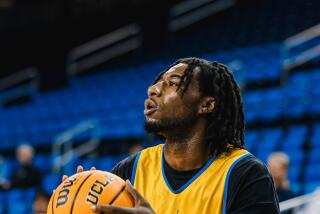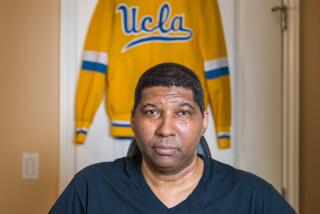Atypical Olympian Finds His Strength
- Share via
In this summer of athletic achievement, Scott Klein’s Olympic moment ended in tears on a rain-soaked track during the 4-by-100-meter relay. The race was over in less than a minute. His journey to the starting line was another story.
A year ago, the 36-year-old Valencia resident could barely breathe, let alone run, after cystic fibrosis clogged his lungs and threatened his life. He underwent a risky double lung transplant in September, allowing him to inhale for the first time in years without effort or pain.
That was how he found himself in late July rounding the track at the University of Minnesota, passing the baton to a fellow transplant recipient as Team Southern California sprinted for gold in what has become known as the “Transplant Olympics.”
The wonder of the moment was enough to bring Klein to tears even before the anchor leg broke the tape.
“If I hadn’t gotten my transplant I probably wouldn’t be here today,” said Klein, chief financial officer for a Burbank record company. “It’s such a miracle. I was on my deathbed a year ago and now I’m winning medals.”
While the eyes of the world focus on the Olympic Games in Athens, a lesser-known Olympic-style event took place this summer. The U.S. Transplant Games featured 1,500 competitors sporting donated kidneys, hearts and livers -- an uncommon group of athletes who wear their surgical scars as badges of honor.
For the eighth time since 1990, the National Kidney Foundation organized the U.S. Transplant Games, a biennial effort to showcase the success of transplantation and encourage organ donation.
This year’s event drew the largest number of athletes ever for the games. The oldest participant was an 83-year-old kidney recipient from New Jersey, the youngest a 2-year-old from Minnesota who received a new liver less than a year ago and competed in a 50-yard dash.
“There are 86,000 people on waiting lists for all kinds of transplants and 17 who die each day,” said Ellie Schlam, spokeswoman for the New York-based National Kidney Foundation. “We use the games to generate awareness about organ donation. We really want people to know that transplantation isn’t experimental. The technology is there, we just need the donors.”
The games drew teams from every state in the nation but Alaska, and some states, such as California, sent multiple squads. Team Southern California had 39 athletes competing in events such as cycling and tennis.
Ventura resident Tom Henry took on every event he could, winning medals in swimming, volleyball and track and field. Of his six medals, three were gold.
The 47-year-old father of three underwent a kidney transplant in March 1994 and months later competed in his first Transplant Games at Emory University in Atlanta. He won four gold medals in those games.
“I’m a real competitive person,” said Henry, who is looking ahead to next summer’s World Transplant Games in Canada.
“To me, [the games] are important because they bring awareness to the need for transplantation of all organs and to the fact that a lot of people are dying everyday who don’t get them,” Henry said. “I’ve also made some great friends all over the world.”
One of his newest friends is Klein. The pair made up half of Team Southern California’s gold medal-winning relay squad and won silver medals together in team volleyball.
Klein gave his silver medal to his doctor, Ventura physician Chris Landon. And he gave his gold to his church, Christ Lutheran in Valencia, which held prayer vigils for him locally and abroad when he underwent the double lung transplant.
Christ Lutheran Senior Pastor Joe Campeau was even on hand this summer in Minnesota to catch Klein in action.
“It is astounding to me that less than a year ago, he was in the hospital, literally struggling for his life,” Campeau said. “But I’m not surprised. The Scott I’ve known has always been quite a determined guy.”
He has had to be. Klein was diagnosed at age 2 with cystic fibrosis, a genetic disease that causes the body to produce a thick mucus that clogs the lungs and obstructs the pancreas.
At that time, Klein said, most children with the disease weren’t living long enough to start kindergarten.
Klein beat those odds and has relied on sports to keep him strong. He competed in track and field at Calabasas High. And he started playing hockey at age 4, a sport he continued through college at Cal Lutheran University in Thousand Oaks and well into adulthood -- when his lungs finally gave out, making it difficult to walk the 10 feet from his living room to his kitchen.
Now, with a new set of lungs from an anonymous donor, he is breathing easy again. Three months after the transplant he was back playing hockey. In March, he biked the Los Angeles Marathon. Now he has a fistful of medals and a sudden need to make plans for himself and his 7-year-old daughter, Alexandra.
“I used to worry that I wouldn’t be able to see my daughter graduate from high school. Now I know I’m going to see my grandchildren,” said Klein, who speaks to audiences about cystic fibrosis and organ donation.
“The last 11 months have been the greatest of my life,” he said. “I got to teach my daughter to ride a bike -- that would have never happened. Now I can really think about my future.”
More to Read
Go beyond the scoreboard
Get the latest on L.A.'s teams in the daily Sports Report newsletter.
You may occasionally receive promotional content from the Los Angeles Times.






